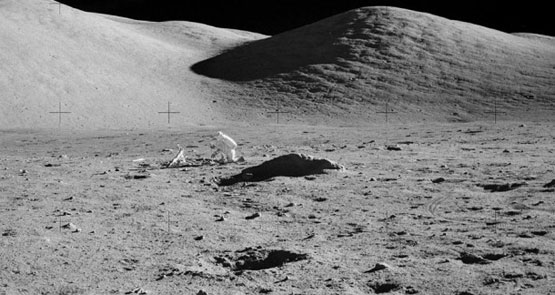
In the vastness of a lunar valley, the last moon man, Eugene Cernan, retrieves a soil core
The longest — and last — Apollo moon mission took off on its incredible journey nearly 43 years ago, and you can follow every minute of it, see rarely displayed photos and hear the raw audio on a remarkable interactive website.
It’s easier to find than the workplace of its creator, Ben Feist, who is the vice-president of technology at Taxi, which is a Canadian ad agency that fits in a taxi. Try googling “Taxi Toronto” and see what happens, so its best to go here to find more about them.
But that aside, this is a stunningly wonderful labour of fascination by Feist, which brings totally alive a real space epic that is quite possibly beyond the comprehension of those who see the world through small hand-held devices obsessed with gastro-narcissism and a fairy-floss diet of manipulative social media feeds.
It also raises the question: when will our species next touch an object further away from Earth than the moon, as well as return to the moon itself, and what might that object be?
But pause a moment, or surrender hours to this abundance of information, to contemplate Apollo 17. This was the last of the Apollo moon missions. In them, 12 spacemen walked on the moon last century; six of them even drove on the its surface, in the case of this expedition, for a total of 35.9 kilometres over three days from the lunar lander Challenger.
Eight of those moon men of the 20th century are alive as of last report, including from Apollo 17, geologist Harrison Schmitt and astronaut Eugene Cernan, while Ronald Evans, who died of a heart attack in 1990, remained alone in lunar orbiter America.
Harrison Schmitt is the last human to date to have stepped onto the lunar surface, on the floor of the Taurus-Littrow valley, while Eugene Cernan, who followed him into the lunar module just before it blasted off to rendezvous with Evans in America, is the last man to have stood on, and stepped off, the moon.
On the way back, Evans made the last of three spacewalks ever made beyond low Earth orbit (all on Apollo missions) to retrieve a package of film from the upper stage of Challenger, working for 47 minutes in an immense void where both the moon and Earth were but small discs against an infinitely large universe.
It is probably easier to grasp what the next deep-space mission to land on an object other than Earth’s moon will seek to explore in person than it is to say “when” with any confidence. It will almost certainly be an asteroid, although it could be a presumed-to-be-inactive comet. There will also be a US space mission to the intangible that is a Lagrange point, gravitational still points located well away from the Earth and moon, which can be very useful for building large structures and doing all sorts of scientific and industrial things.
China, Russia and India all seem committed in various measures to a manned lunar expedition, and even the establishment of a base. Mars continues of course to fascinate space tragics as the separate planet of choice once a number of difficulties are overcome, since the nearest planet to Earth, Venus, is incredibly hot, corrosive and buried under a crushing, acid-rich atmosphere.
Not that Mars, an asteroid, or a prolonged stay on the moon is quite feasible as yet, but the required technological skills and discoveries are being progressed, and made. It will come to pass, possibly after many of us have passed, and, one might sadly expect, all the Apollo men on the moon have died.
To Ben Feist, who has worked so hard to tell the story of last moon men of the 20th century, respect and honour from those of us who remember those days.








Thank you very much for writing about my project. I appreciate your kind words. It really was a huge effort and all I can say is that the spirit in which this article is written is what kept me going over the years. I hope my efforts are enough to cause people to take pause and contemplate the future of human space flight as you have.
Cheers,
Ben Feist
http://apollo17.org
http://benfeist.com/category/apollo/